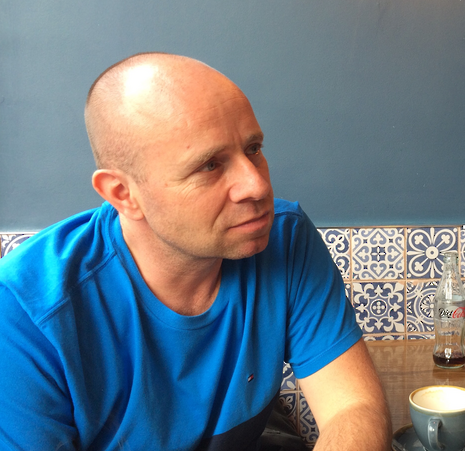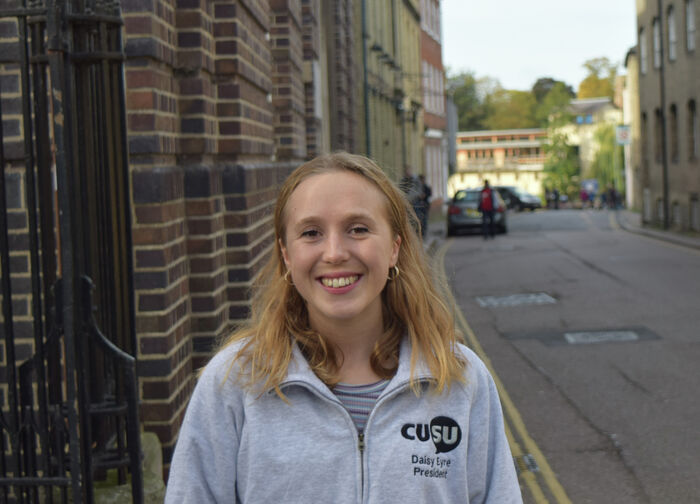Dr Flavio Toxvaerd: Economics as an Art
In the first of a series of interviews exploring the work of Cambridge academics, Helena Coggan meets economist Dr Toxvaerd

On the bookshelf behind the desk in Dr Flavio Toxvaerd’s Economics Faculty office is a book called Gibbons’ and Robert’s Handbook of Organisational Economics. It looks about a thousand pages long. You wouldn’t want that dropped on your head from his second-floor window, I remark at the start of our interview.
Dr Toxvaerd pushes back his rolling chair and, gesturing to the various shelves, starts showing me his “reference library”. The Handbook, he says, is part of his collection of “more traditional” economics subjects, next to similarly threatening tomes on finance and game theory. Next to it, however, is a book on mathematical linguistics. “There aren’t economists contributing to that,” he says. It’s about “formalising language, making machine translations more reliable”.
Up on the left are books on mathematical epidemiology. “I’m what economists think of an economic theorist,” he says. “I don’t work with data, I work with mathematical models of economic situations.” There is a book on abstract algebra directly behind his chair. His, he says, is a “fairly broad field”.
Dr Toxvaerd’s areas of research don’t concern what might be thought of as traditional economics. His most recent paper, On the Dynamics of Beliefs and Risky Sexual Behaviour, analyses the mechanics involved in the spread of asymptomatic STDs, such as HIV, and is full of mathematical terminology and formulae. Two of its many graphs are taped to his office door.
Reading one of his publications, “you could be forgiven for thinking that it was a paper in operations research or applied mathematics”. As a theorist, he doesn’t use statistics and generally eschews the simulation software favoured by those making “infinitely more complex models”. Most of his mathematical work is done on pen and paper. “The culture” in microeconomics, he says, “is a little bit against [simulation], still.”
“Despite his mathematical background, he speaks of economics as an art, using intuition as much as scientific analysis”
Dr Toxvaerd grew up in Denmark, though his mother was Argentinian. He was interested in economics “from an early age, like many people,” though his childhood ambition, he admits, was to become a theoretical physicist. He gained “quite a strong background” in optimal control theory, a branch of mathematics, and his research often requires him to work with scientists from other disciplines, although this is largely through lack of choice: he estimates that there are only fifteen to twenty other economic epidemiologists in the world. Do they all have a group chat? They “bounce ideas off each other,” he admits.
Dr Toxvaerd speaks fluently and unwaveringly, with a lecturer’s enthusiastic, explanatory tone. He moves smoothly from idea to idea, using layman’s terms for my benefit. It feels more or less like sitting in a supervision. He uses hand gestures to illustrate what he says, tracing graphs in the air. He’s says that he’s “a bit unusual” in that he “can’t keep still”: on a typical day he works as much in libraries and coffee shops as he does in the office. His working day stretches into evenings and weekends: “when you’re a researcher, you don’t have office hours as such.”
Despite his mathematical background, he speaks of economics as an art, using intuition as much as scientific analysis. His way of working is “partly to do with taste, partly to do with experience, and partly to do with ability”. He starts in “very much the same way as a sketch artist” – he starts by formalising a situation “in the simplest possible way, mathematically”, and derives his conclusions about human behaviour logically from there. The process is about “enriching” his models, making them “seem more realistic”.
Is there any way to check, after a paper is published, that he was right? He gently corrects the premise of the question. His work, he says, “is no different from a proof in mathematics. If the proof is mathematically correct, then there’s no way you can prove me wrong.” So if another economist was analysing the same situation using the same methods, they would come to the same conclusion? “That’s a lot of ifs,” he answers. It’s rare that two economists will use the same starting assumptions to tackle a problem: they often have “different priorities, different interests”.
He gives “innumerable seminars” on his papers. Most of his teaching work involves graduate students, although he also supervises third-year economics undergraduates as a fellow of Clare College. Having taught at universities in Israel and Portugal in the early years of the millennium, he came to Cambridge following his wife, a fellow economist – “not that one needs reasons” to come here, he adds, smiling. “I have very good colleagues, I have amongst the cleverest undergraduates that you could imagine…”
He shows me the view of Selwyn College’s lake from his window, glittering in the sunset through the trees: “it’s barely visible now, because of the leaves.” But it’s October, and bitterly cold. The leaves are already falling
 News / Copycat don caught again19 April 2024
News / Copycat don caught again19 April 2024 News / Emmanuel College cuts ties with ‘race-realist’ fellow19 April 2024
News / Emmanuel College cuts ties with ‘race-realist’ fellow19 April 2024 Theatre / The closest Cambridge comes to a Drama degree 19 April 2024
Theatre / The closest Cambridge comes to a Drama degree 19 April 2024 News / Acting vice-chancellor paid £234,000 for nine month stint19 April 2024
News / Acting vice-chancellor paid £234,000 for nine month stint19 April 2024 Interviews / ‘People just walk away’: the sense of exclusion felt by foundation year students19 April 2024
Interviews / ‘People just walk away’: the sense of exclusion felt by foundation year students19 April 2024





